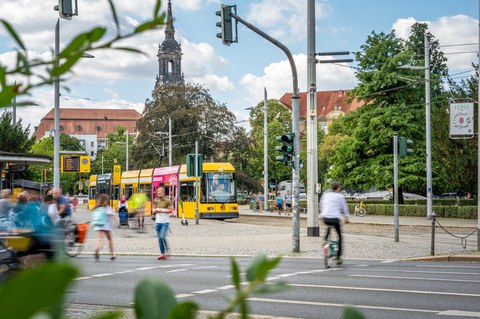Apr 04, 2025
On the road: Study on everyday transport in urban areas reveals shift in mobility behavior
The research project “Mobility in Cities – SrV” uses an extensive household survey to regularly collect data on the mobility behavior of the residents of German cities. In the 2023 survey, more than 280,000 people in around 500 municipalities answered questions on their mobility behavior. Researchers at the Chair of Mobility System Planning at TUD Dresden University of Technology have identified a clear trend towards increased walking and cycling.
Mobility data is an indispensable part of municipal transportation planning
The 12th round of the “System representative traffic survey” (SrV), which was founded in 1972, took place between February 2023 and March 2024. Using a multi-method approach, the survey gathered data on the travel behavior of 281,998 individuals in 125,038 households, covering a total of 884,332 trips. The large sample size also allowed for differentiated insights into the development of mobility across various urban and population groups. With an initial 97 contracting institutions, the survey was conducted in some 500 cities and municipalities in 14 German federal states. The data can be used as the basis for drawing city-specific, comparative and cross-city conclusions about people's mobility behavior.
Prof. Regine Gerike, Chair of Mobility System Planning, knows that the data obtained is essential for future transport planning: “Household surveys on everyday mobility require particularly complex data collection and are an indispensable part of municipal mobility planning. The high demand for this data was reflected in the 2023 survey by the large number of study areas and the comprehensive sample, which allows for comparative analysis. The quality of the data collection in 2023 was again at a high level, so the survey provides reliable updates to the long-term study.”
Mobility trends: “Active mobility” and needs-based mobility behavior
The “Mobility in Cities” study identifies key mobility indicators for Germany's urban populations at five-year intervals. The focus of the 2023 SrV survey was weekdays, excluding vacations and public holidays. The scientific analyses conducted by the Chair suggest, among other things, that a significant part of the observed trends can be attributed to changes in the mobility behavior of the working population.
The researchers note a significant change in people's urban mobility behavior compared to the last survey in 2018. This includes walking more often – a trend that is being reinforced among the working population as a result of people working from home. However, this trend is not unique to the working population. In addition, cycling continues to be important to many people, and in many places the numbers have increased compared to 2018. After the pandemic-related slump, public transportation has recovered spectacularly. The popularity of the 9-Euro-Ticket and the Deutschlandticket, introduced in May 2023, played a significant role in this. Car use continues to decline, especially in urban and metropolitan areas. However, pensioners living outside of cities are driving more than in 2018. Finally, the range of mobility options available continues to grow. The trend towards more electric bikes continues, and the Deutschlandticket was already playing a significant role by the end of 2023.
The comprehensive results were presented to 130 researchers and practitioners at a final conference at TU Dresden. The next SrV survey conducted by the “Mobility in Cities” study will take place in 2028, the anniversary year of TUD Dresden University of Technology.
About the "Friedrich List" Faculty of Transport and Traffic Sciences:
The "Friedrich List" Faculty of Transport and Traffic Sciences is the largest academic center of excellence in the field of traffic sciences in Germany. With its interdisciplinary teaching and research network, the faculty works on future-oriented mobility in the areas of rail, road and air transportation. Together with national and international partners from science and industry, the faculty develops systemic solutions for the design of safe, efficient and sustainable transportation systems according to technical, economic, ecological and societal criteria.
Contact:
“Friedrich List” Faculty of Transport and Traffic Sciences
Project manager Mobility in Cities – SrV
Dr.-Ing. Stefan Hubrich
Email:

